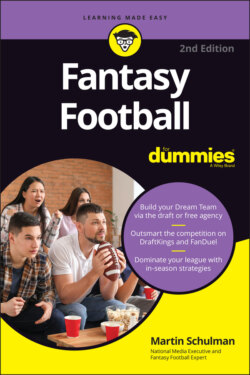Читать книгу Fantasy Football For Dummies - Martin A. Schulman - Страница 67
What a commish does: The basics
ОглавлениеAs a commissioner, your first step is to determine if you want to run a free or pay league. You also have to determine how casual or competitive you want the league to be. After you have those answers, just set up the league accordingly. Here’s a bulleted overview of your commish duties before the season starts:
Create a new league: Pick a league provider, sign up, pay the league dues yourself and choose how many teams you want to have in your league. (Part 4 discusses the major providers.)
Invite coaches to join: You can’t play by yourself, right? Try to invite people you can count on to play and to pay you their share of the league dues.
Set the league rules: This includes roster size, position requirements, roster deadlines, and scoring modifiers. Of course, you can leave the league defaults in place and save yourself lots of time, but would that be fun?
Set the draft day and time: The site offers you options, but you have to be in touch with your league and make sure everyone can be there on time if you’re not using an auto draft.
After the season begins, you may encounter more headaches. You have to do these things:
Review trades and trade protests: When two teams make a deal, the commish has to approve it in most leagues. If other coaches don’t like it, they can file a protest with you and then you have to rule on the deal (see Chapter 11 for more).
Oversee coaches’ conduct: Everything from not benching injured players to using foul language on a public message board can affect your league and make it no fun for anyone. The commish must be proactive all season long to ensure the success of his league by disciplining such actions or warning the coaches to shape up or ship out.
As a commissioner, your friends and coworkers will expect you to be on call 24/7 to answer questions, take harassment, and otherwise buy into doing things their way. You’ll be bombarded with suggestions leading up to every decision you make. Messages from your fellow coaches will no longer begin with, “How’s it going?” Instead, you’ll get “I would have,” “You should have,” or “I can’t believe you.” When adults engage in “did too, did not” behavior, they play rougher than children, and as the commish, you must keep the big kids’ sandbox clean, safe, and fun to play in.
